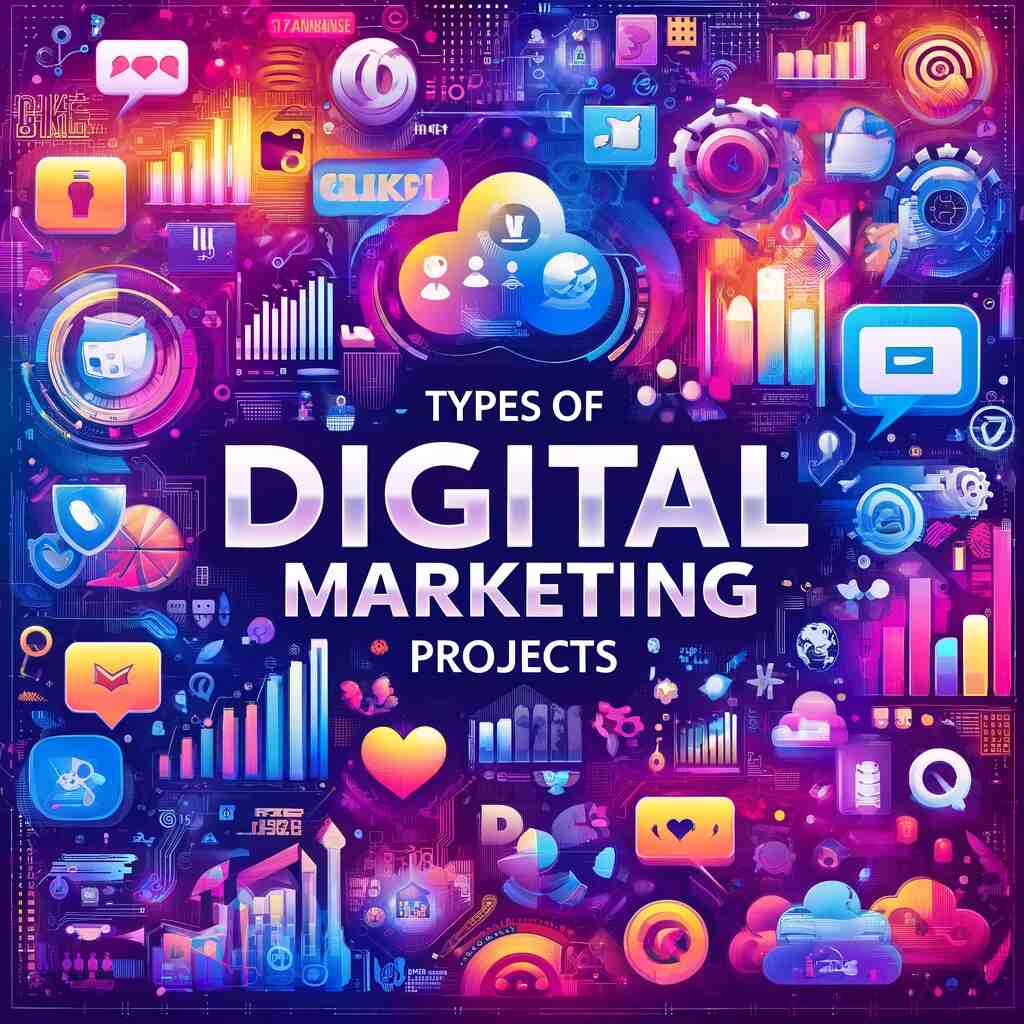Launch your digital marketing projects! Master projects in SEO, content marketing & more. Learn to plan, track & impress with this ultimate guide.

Introduction
What are digital marketing projects?
Digital marketing projects are practical exercises designed to achieve specific marketing goals using online channels. These projects can range from building a website and developing content to running social media campaigns and analyzing marketing data. They are essentially mini-campaigns that allow you to test your digital marketing skills, learn new strategies, and gain valuable experience.
Why are digital marketing projects important?
Digital marketing is a constantly evolving field, and hands-on experience is crucial for success. Projects provide a platform to:
- Develop practical skills: By working on real-world scenarios, you can hone your skills in areas like SEO, content marketing, social media management, and analytics.
- Build a strong portfolio: Showcase your capabilities to potential employers or clients by demonstrating your work on completed projects.
- Apply theory to practice: The world of digital marketing is full of concepts and strategies. Projects allow you to put this theoretical knowledge into action and see how it translates into tangible results.
- Test and experiment: You can explore different digital marketing approaches and measure their effectiveness through projects. This experimentation allows you to learn from successes and failures, ultimately refining your strategies.

Benefits of undertaking digital marketing projects:
There are numerous benefits to taking on digital marketing projects, including:
- Skill development: As mentioned earlier, projects allow you to develop and refine a broad range of digital marketing skills. This can be incredibly valuable for both aspiring marketers looking to enter the field and experienced professionals seeking to stay ahead of the curve.
- Portfolio building: A strong portfolio showcasing your digital marketing accomplishments can be a game-changer when applying for jobs or attracting clients. Projects provide concrete examples of your skills and the value you can bring to the table.
- Applying theory: Digital marketing textbooks and courses are great for building foundational knowledge, but projects bridge the gap between theory and practice. They allow you to see how strategies work in real-world scenarios and gain a deeper understanding of their effectiveness.
- Boosting creativity and problem-solving: Projects often require you to think outside the box and develop creative solutions to marketing challenges. This can enhance your problem-solving skills and help you approach marketing campaigns with a fresh perspective.
- Building confidence: Successfully completing a digital marketing project can give you a significant confidence boost in your abilities. This newfound confidence can translate into stronger job interviews and improved performance in your marketing endeavors.

Advance Digital Skills: Master In-Demand Skills Through Real-World Projects
Supercharge your digital marketing skills at Advance Digital Skills! Dive deep into practical projects covering SEO, WordPress website building, web design basics, guest blogging outreach, Shopify dropshipping, and even eBay mastery. Our hands-on approach lets you learn by doing, building a powerful portfolio, and acquiring the in-demand skills businesses crave. Enroll now and launch your digital marketing career with confidence!

Types of Digital Marketing Projects
Digital marketing projects can be categorized into three main areas: Foundational Skill Development Projects, Marketing Strategy Projects, and Analysis and Reporting Projects. Each type serves a distinct purpose and helps you develop a specific skill set.
A. Foundational Skill Development Projects
These projects focus on building the core skills necessary for any digital marketing professional.
- Website development: Learn the basics of website creation by building a website from scratch using a platform like WordPress. This project will introduce you to website structure, content management, and user experience (UX) principles.
- Content creation: Content is king in digital marketing. Hone your writing skills by crafting engaging blog posts or develop your visual communication skills by designing infographics. This project allows you to experiment with different content formats and understand how to create compelling content for your target audience.
- Graphic design and video editing: Visuals play a crucial role in capturing attention online. Develop your graphic design skills by creating social media graphics or learn basic video editing techniques for crafting short marketing videos. This project will enhance your ability to communicate messages effectively through visual storytelling.
B. Marketing Strategy Projects
Once you have a solid foundation, you can delve into developing and implementing marketing strategies for specific campaigns.
SEO audit and improvement plan:
Conduct an SEO audit to analyze the health of a website and develop a plan to improve its search engine ranking. This project will teach you best practices for on-page and off-page SEO optimization.
Content marketing strategy development:
Craft a comprehensive content marketing strategy for a specific brand or industry. This project will require you to define content goals, identify target audiences, and develop a content calendar that aligns with your overall marketing objectives.
Social media marketing strategy for a specific industry:
Develop a targeted social media marketing strategy for a particular industry. This project will involve identifying the most relevant social media platforms for your target audience, understanding industry-specific best practices for social media engagement, and developing a content strategy tailored to that industry.
Pay-per-click (PPC) advertising campaign development:
Learn the basics of PPC advertising by creating a sample PPC campaign for a specific product or service. This project will introduce you to keyword research, ad copywriting, and campaign budget management.
Email marketing campaign creation:
Craft an email marketing campaign designed to achieve a specific objective, such as lead generation or customer engagement. This project will help you understand email marketing best practices, including creating targeted email lists, crafting compelling subject lines, and designing effective email layouts.
Remarketing campaign strategy:
Develop a remarketing strategy to re-engage with website visitors who haven’t converted. This project will teach you how to utilize remarketing tools and strategies to capture lost leads and improve conversion rates.
Interactive marketing project:
Get creative by developing an interactive marketing project, such as a survey or quiz, to generate leads or promote brand awareness. This project allows you to experiment with different engagement strategies and understand how to make your marketing more interactive.
C. Analysis and Reporting Projects
These projects focus on analyzing data and translating it into actionable insights to improve marketing performance.
- Web analytics report (using Google Analytics): Utilize Google Analytics to analyze website traffic data and generate a report that provides insights into user behavior and website performance. This project will teach you how to interpret key metrics like website traffic sources, user engagement, and conversion rates.
- SEO case study: Analyze the impact of SEO efforts on a website’s organic search ranking by conducting a case study. This project will help you understand how SEO strategies can improve website visibility and organic traffic.
- Conversion rate optimization (CRO) case study: Analyze the effectiveness of CRO efforts on a website and create a case study showcasing the results. This project will teach you how to identify conversion bottlenecks and implement strategies to increase conversions.
- Social media advertising campaign analysis: Analyze the performance of a social media advertising campaign and develop a report with actionable insights for improvement. This project will help you understand how to measure the success of social media campaigns and optimize your ad spend.
- Return on Investment (ROI) analysis for various digital marketing channels: Calculate the ROI of different digital marketing channels to determine where your marketing budget is most effective. This project will equip you with the skills to evaluate the effectiveness of your marketing spend and make data-driven decisions.
Project Selection
Choosing the right digital marketing project is crucial for maximizing your learning and achieving success. Here are some key factors to consider when selecting a project:
- Skill Level:
- Beginner: If you’re new to digital marketing, focus on foundational skill development projects like website building, content creation, or basic graphic design. These projects will equip you with the essential skills needed for more advanced projects.
- Intermediate: With a solid foundation, you can move on to marketing strategy projects. Consider developing a content marketing strategy or crafting a social media marketing plan for a specific industry. These projects will allow you to apply your knowledge to real-world scenarios.
- Advanced: For experienced marketers, delve into analysis and reporting projects. Analyze website traffic data using Google Analytics or conduct a case study on the impact of an SEO campaign. These projects will hone your analytical skills and your ability to translate data into actionable insights.
- Project Goals:
- What do you hope to achieve with this project? Do you want to develop a specific skill, build your portfolio, or test a new marketing strategy? Clearly define your goals to choose a project that aligns with your objectives.
- Available Resources:
- Consider the time, budget, and tools you have available. Some projects may require access to specific software or data sets. Choose a project that is feasible given your resource constraints.
Finding Project Ideas:
There are numerous ways to find inspiration for your digital marketing project:
- Work with a Local Business: Many local businesses are eager to improve their online presence but lack the resources or expertise. Partner with a local business to develop and implement a digital marketing strategy for them. This is a fantastic way to gain real-world experience and build your portfolio.
- Create a Project for Your Personal Brand: Even if you don’t currently have a business, you can still create a digital marketing project to promote yourself or a personal brand. Develop a blog with a specific niche, build a strong social media presence, or create an infographic showcasing your skills and experience. This allows you to demonstrate your marketing capabilities to potential employers or clients.
- Online Resources: Several websites and online communities offer project ideas and inspiration for digital marketing professionals. Browse online resources for marketing challenges, case studies, and project templates to spark your creativity.
- Freelance Platforms: Freelance platforms like Upwork or Fiverr can be a great source for project ideas. Browse through project listings to see what types of digital marketing services businesses are looking for. This can provide valuable insights into current industry trends and potential project opportunities.
Project Planning and Execution
Once you’ve chosen your digital marketing project, it’s time to plan and execute it effectively. Here are the key steps involved:
A. Defining Project Goals and Objectives:
- Start with the big picture: What is the overall goal you want to achieve with your project? Is it to increase brand awareness, generate leads, or boost website traffic?
- Break down the goal into specific objectives: These objectives should be SMART (Specific, Measurable, Achievable, Relevant, and Time-bound). For example, a specific objective for increasing brand awareness could be to gain 1,000 new followers on social media within three months.
B. Developing a Project Timeline and Budget:
- Create a realistic timeline: Break down the project into smaller tasks and estimate the time required to complete each one. Factor in buffer time for unexpected delays.
- Develop a budget: Identify any costs associated with your project, such as software subscriptions, stock photos, or advertising spend. Ensure your budget aligns with your resources.
C. Identifying Necessary Tools and Resources:
- Make a list of the tools and resources you’ll need to complete your project successfully. This could include project management platforms, content creation tools, analytics software, or design resources.
- Identify any skills gaps you may have and explore learning resources to fill those gaps.
D. Project Execution Stages:
- Research: Gather information relevant to your project. This could involve researching your target audience, competitor analysis, or learning about best practices in your chosen marketing area.
- Implementation: This is where you put your plan into action. This may involve creating content, launching your marketing campaign, or building a website.
- Testing: Throughout the implementation phase, test your strategies and monitor their effectiveness. This allows you to identify any issues and make adjustments as needed.
- Analysis: Once your project is complete, analyze the results. Did you achieve your objectives? What worked well, and what could be improved?

Project Presentation and Reporting
A. Preparing a Clear and Concise Presentation of Your Project Outcomes:
- Develop a visually appealing presentation: Use clear visuals, charts, and graphs to showcase your findings.
- Focus on the key takeaways: Summarize your project goals, methods used, and the main results achieved.
- Highlight the impact of your project: Demonstrate how your project contributed to achieving the overall marketing objectives.
B. Creating a Project Report Documenting Your Process and Findings:
- Develop a comprehensive report: Include details about your project goals, methodology, results, and analysis.
- Document your challenges and learnings: Be transparent about any difficulties you faced and the key takeaways you gained from the experience.
- Tailor your report to your audience: Consider who will be reading your report and adjust the level of detail accordingly.
By following these steps, you can effectively plan, execute, present, and report on your digital marketing project, showcasing your skills and maximizing your learning experience.
Conclusion
Recap of the Importance of Digital Marketing Projects
Digital marketing projects are invaluable for anyone interested in pursuing a career in this dynamic field. They offer a multitude of benefits, including:
- Developing practical skills: Gain hands-on experience with various digital marketing tools and techniques.
- Building a strong portfolio: Showcase your capabilities and accomplishments to potential employers or clients.
- Applying theory to practice: Bridge the gap between theoretical knowledge and real-world application of marketing strategies.
- Boosting creativity and problem-solving: Develop creative solutions to marketing challenges and learn to think critically about marketing campaigns.
- Building confidence: Successfully completing a project can significantly enhance your confidence in your digital marketing abilities.
By actively engaging in digital marketing projects, you can gain a competitive edge in the job market, improve your marketing skills, and ultimately achieve your marketing goals.
Key Takeaways and Next Steps
This outline has provided a comprehensive overview of digital marketing projects. Here are some key takeaways to remember:
- Digital marketing projects come in various forms, catering to different skill levels and project goals.
- Carefully consider your skillset, resources, and objectives when selecting a project.
- Effective planning, execution, presentation, and reporting are crucial for project success.
- Leverage online resources and platforms to find project inspiration and stay updated on industry trends.
Next Steps:
- Choose a digital marketing project that aligns with your interests and goals.
- Develop a detailed project plan outlining your timeline, budget, and resources.
- Actively research and learn about the chosen marketing area.
- Implement your project, monitor results, and make adjustments as needed.
- Document your project journey and prepare a compelling presentation and report.
- Seek feedback on your project and continuously strive to improve your digital marketing skills.
Remember, the digital marketing landscape is constantly evolving. By actively engaging in projects, you can stay ahead of the curve, refine your skills, and become a valuable asset in the ever-growing world of digital marketing.
